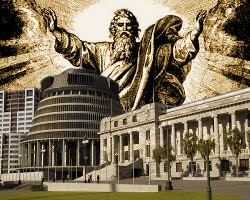 In the Nuts and Bolts series I lay out some of the basic concepts thrown around in my areas of interest – philosophy, theology and biblical studies – and explain them for those unfamiliar with them.
In the Nuts and Bolts series I lay out some of the basic concepts thrown around in my areas of interest – philosophy, theology and biblical studies – and explain them for those unfamiliar with them.
This time I’m looking at the “Original Position,” a term that originates with John Rawls, one of the most significant political philosophers of the 20th century. Rawls, like many people in the Western democratic tradition, advanced a form of social contractarianism; the view that the principles of just government are grounded in an agreement (a “social contract”) between the governed and those who govern. Those who govern must govern according to the terms of that contract, and in fact fellow citizens should only support policies or laws that are in keeping with that contract.
But what sort of contract would that be? Is it an overtly stated contract that we all actually agree to? No. Like many other social contractarians (e.g. John Locke), Rawls realised that the types of contracts that everyone might actually agree to could be significantly flawed in all kinds of ways. We want to think of social arrangements in terms of contracts partly because it stresses the fact that each side has the power to negotiate with the other on equal footing with them. But this is often not the case. Simply out of ignorance, for example, we might agree to terms that are actually unjust to us and unfairly advantageous to others. What if members of an ethnic minority in your society were willing to agree to a social contract that, unbeknownst to them, actually had the consequence that they were exploited and seriously disadvantaged when it came to, say, employment? What if all the kind, gentle people were happy to endure conditions in, say, trade negotiations that were flagrantly unfair to them and helpful to cutthroat, assertive, dishonest swindlers? So the actual contracts that people happen to form aren’t really good enough here.
What is needed to come up with the standard of what sorts of laws and public policies are acceptable, then, is a kind of hypothetical social contract, one that we would arrive at under idealised conditions. And what sort of conditions are those, you might ask? Here is where the title of this blog comes into play: The constitutional basis of law and government in a just society, says Rawls, are those that we – or at least ideal versions of ourselves – would formulate from the perspective of the Original Position.

